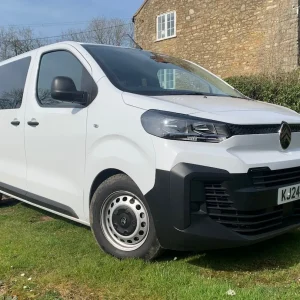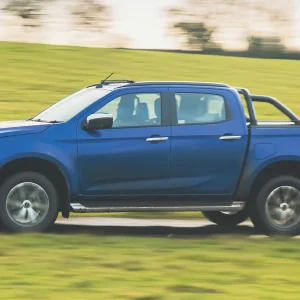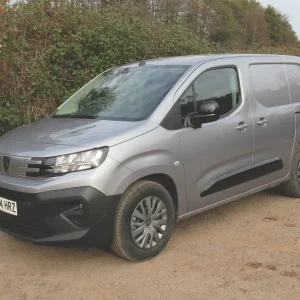Ssangyong has spruced up the Korando Sports pick-up it introduced into the UK just over a year ago.
The vehicle now has speed-sensitive power steering and a choice of three improved Pegasus hard-top covers for its load area. Ssangyong has also upped its towing capacity from 2.3 to 2.7 tonnes.
The Korando is certainly not the most rugged of workhorse pick-ups, and the manufacturer prefers to sell it on the basis of its more refined driving manners, due, in a large part, to its multi-link rear suspension. It claims the vehicle appeals to customers who need the practicality of four-wheel drive combined with the comfort of a family car. With a payload of just 643kg (630kg for the auto) it definitely won’t be on the wish lists of any big fleets.
“Small businesses who do a lot of on-roading are our main customers,” says marketing boss Steve Gray, who has a clear vision of where the Korando fits into the market. “It’s more like
a 4×4 than a pick-up. If you want a crossover to cover long distances, we win. If you want payload, we lose.”
The Korando Sports has a starting price of £15,042 excluding VAT for the SX trim version. The problem is that with its sub-1.0t payload, the VAT cannot be reclaimed unless the buyer can prove the vehicle will be used solely for work purposes. If not, the addition of the 20% tax raises the price to £17,995. Even at this price, Gray claims the model is still competitive with the likes of “middle-ranking” pick-ups, such as the Isuzu D-max.
The higher-trim EX model we tested came with automatic six-speed transmission wedded to the 2.0-litre 155hp engine used across the line-up. It costs £18,375 without VAT and £21,995 with VAT.
On top of this price, it included the Elegance hard top for £1995, Kenwood audio system with DAB radio, iPod and Bluetooth (£999), metallic paint (£500), fixed towbar (£456), reversing camera (£179) and load liner (£60).
The level of standard equipment is generous, with
18-inch alloys, cruise control, leather seats, electrically adjustable driver’s seat, heated front seats, rear parking sensors, manual air-conditioning, and reclining second-row seats all included.
Despite this, the interior does not exude luxury – the preponderance of hard plastic and black furnishing creates a somewhat bleak ambiance.
The steering wheel-mounted controls are large and easy to use, in contrast to the buttons on the Kenwood radio, which are irritatingly tiny, as is the clock, which displays minutes beneath the hour – not an aesthetically pleasing arrangement.
The ride is smooth on-road until you get onto uneven surfaces, when it gets a bit jittery, but the six-speed auto is impressively slick in tandem with the responsive drivetrain and can be switched easily into manual mode via a button on the gear stick. The view through the narrow rear-view mirror is restricted, but this is compensated for by the good vision afforded by the wing mirrors. Apart from a decent-sized central box there is not much stowage space by LCV standards for bits and pieces such as water bottles, laptops and clipboards. On the other hand, there is a 12V socket
on the passenger seat side to plug in tools. Rear passengers will welcome the big comfortable seats, although taller occupants may lack a little leg room.
The hard-top hatch is included in the remote locking system, which is a nice touch, but it rests on gas struts and slams shut hard and quick, so don’t leave your fingers on the tailgate door.
When off-road on sodden fields and slippery mud slopes the Korando Sports Pick-up’s selectable 4×4 system, which includes a low-speed setting for particularly rough terrain, seems fit to handle everything a farmer could throw at it.
Verdict
The Korando Sports will suit customers valuing good road manners over a big payload.





